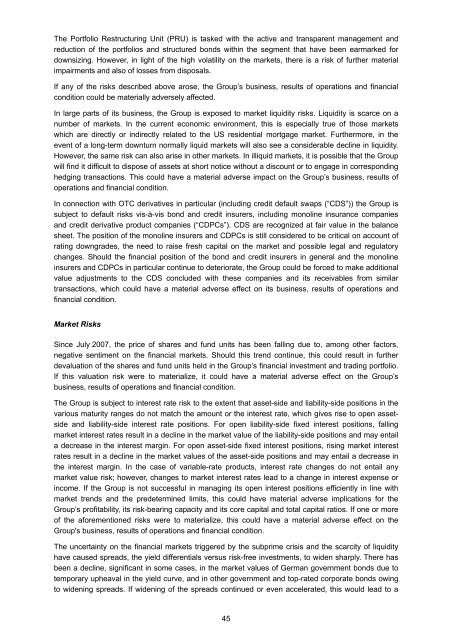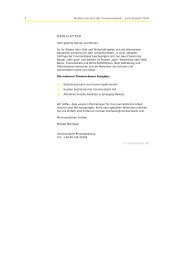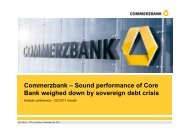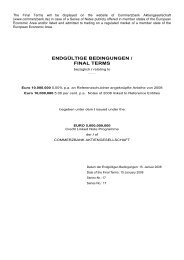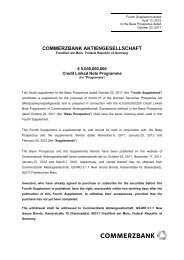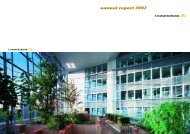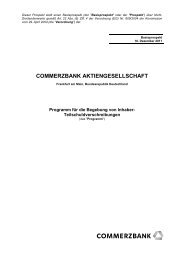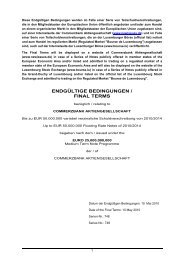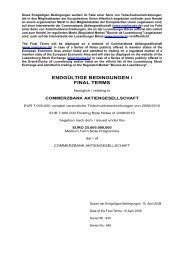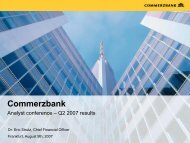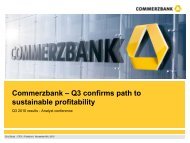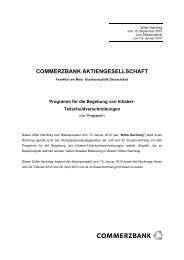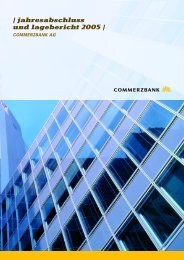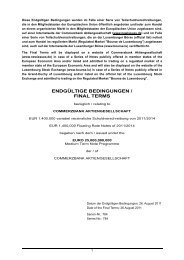COMMERZBANK AKTIENGESELLSCHAFT
COMMERZBANK AKTIENGESELLSCHAFT
COMMERZBANK AKTIENGESELLSCHAFT
You also want an ePaper? Increase the reach of your titles
YUMPU automatically turns print PDFs into web optimized ePapers that Google loves.
The Portfolio Restructuring Unit (PRU) is tasked with the active and transparent management and<br />
reduction of the portfolios and structured bonds within the segment that have been earmarked for<br />
downsizing. However, in light of the high volatility on the markets, there is a risk of further material<br />
impairments and also of losses from disposals.<br />
If any of the risks described above arose, the Group’s business, results of operations and financial<br />
condition could be materially adversely affected.<br />
In large parts of its business, the Group is exposed to market liquidity risks. Liquidity is scarce on a<br />
number of markets. In the current economic environment, this is especially true of those markets<br />
which are directly or indirectly related to the US residential mortgage market. Furthermore, in the<br />
event of a long-term downturn normally liquid markets will also see a considerable decline in liquidity.<br />
However, the same risk can also arise in other markets. In illiquid markets, it is possible that the Group<br />
will find it difficult to dispose of assets at short notice without a discount or to engage in corresponding<br />
hedging transactions. This could have a material adverse impact on the Group’s business, results of<br />
operations and financial condition.<br />
In connection with OTC derivatives in particular (including credit default swaps (“CDS”)) the Group is<br />
subject to default risks vis-à-vis bond and credit insurers, including monoline insurance companies<br />
and credit derivative product companies (“CDPCs”). CDS are recognized at fair value in the balance<br />
sheet. The position of the monoline insurers and CDPCs is still considered to be critical on account of<br />
rating downgrades, the need to raise fresh capital on the market and possible legal and regulatory<br />
changes. Should the financial position of the bond and credit insurers in general and the monoline<br />
insurers and CDPCs in particular continue to deteriorate, the Group could be forced to make additional<br />
value adjustments to the CDS concluded with these companies and its receivables from similar<br />
transactions, which could have a material adverse effect on its business, results of operations and<br />
financial condition.<br />
Market Risks<br />
Since July 2007, the price of shares and fund units has been falling due to, among other factors,<br />
negative sentiment on the financial markets. Should this trend continue, this could result in further<br />
devaluation of the shares and fund units held in the Group’s financial investment and trading portfolio.<br />
If this valuation risk were to materialize, it could have a material adverse effect on the Group’s<br />
business, results of operations and financial condition.<br />
The Group is subject to interest rate risk to the extent that asset-side and liability-side positions in the<br />
various maturity ranges do not match the amount or the interest rate, which gives rise to open assetside<br />
and liability-side interest rate positions. For open liability-side fixed interest positions, falling<br />
market interest rates result in a decline in the market value of the liability-side positions and may entail<br />
a decrease in the interest margin. For open asset-side fixed interest positions, rising market interest<br />
rates result in a decline in the market values of the asset-side positions and may entail a decrease in<br />
the interest margin. In the case of variable-rate products, interest rate changes do not entail any<br />
market value risk; however, changes to market interest rates lead to a change in interest expense or<br />
income. If the Group is not successful in managing its open interest positions efficiently in line with<br />
market trends and the predetermined limits, this could have material adverse implications for the<br />
Group’s profitability, its risk-bearing capacity and its core capital and total capital ratios. If one or more<br />
of the aforementioned risks were to materialize, this could have a material adverse effect on the<br />
Group's business, results of operations and financial condition.<br />
The uncertainty on the financial markets triggered by the subprime crisis and the scarcity of liquidity<br />
have caused spreads, the yield differentials versus risk-free investments, to widen sharply. There has<br />
been a decline, significant in some cases, in the market values of German government bonds due to<br />
temporary upheaval in the yield curve, and in other government and top-rated corporate bonds owing<br />
to widening spreads. If widening of the spreads continued or even accelerated, this would lead to a<br />
45


